|
Books Should Be Free Loyal Books Free Public Domain Audiobooks & eBook Downloads |
|
|
Books Should Be Free Loyal Books Free Public Domain Audiobooks & eBook Downloads |
|
Science Fiction |
|---|
|
Book type:
Sort by:
View by:
|
By: Ray Cummings (1887-1957) | |
|---|---|
 Phantoms of Reality
Phantoms of Reality
Red Sensua's knife came up dripping—and the two adventurers knew that chaos and bloody revolution had been unleashed in that shadowy kingdom of the fourth dimension. | |
 Jetta of the Lowlands
Jetta of the Lowlands
Fantastic and Sinister Are the Lowlands into Which Philip Grant Descends on His Dangerous Assignment. | |
 Man on the Meteor
Man on the Meteor
Nemo's first memory is of waking up on a self-contained world on a meteor in the rings of Saturn. Soon he meets Nona, and together they explore their world. New discoveries, hidden wonders, and an entire civilization are tucked away on the little meteor. Originally published as a serial in Science and Invention magazine, from January to September 1924. | |
 Flame Breathers
Flame Breathers
Did the planet Vulcan exist? It supposedly orbited our sun on the opposite side from the Earth but it was only theoretical speculation. One expedition had mysteriously disappeared, and now another was following in its path—searching for the truth about this planet's existence. Was there really an unknown menace that stalked Vulcan's shadowed gorges." This was first published in Planet Stories March 1943. | |
By: Raymond Z. Gallun (1911-1994) | |
|---|---|
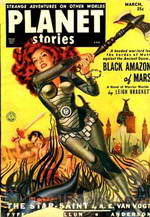 Asteroid of Fear
Asteroid of Fear
John Endlich needed to clean up his act. Gambling, drinking, a hot temper and wanderlust were the last things Rose and the kids needed. So he went to the Homesteaders Office and signed up to terraform Vesta, a chunk of a once thriving alien planet that had exploded from within; a flat lump of crust which was now the remains of a farm on one side and a mining operation on the other. The miners hated Endlich and sabotaged his plans at every opportunity. They were going to kill him and his family if he didn’t find a way to stop them. - Asteroid of Fear was first published in the March, 1951 edition of Planet Stories magazine. | |
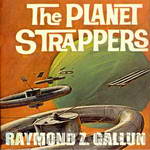 The Planet Strappers
The Planet Strappers
The Planet Strappers started out as The Bunch, a group of student-astronauts in the back room of a store in Jarviston, Minnesota. They wanted off Earth, and they begged, borrowed and built what they needed to make it. They got what they wanted--a start on the road to the stars--but no one brought up on Earth could have imagined what was waiting for them Out There! | |
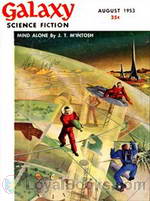 Stamped Caution
Stamped Caution
When an alien spacecraft crashes in Missouri a team of army investigators is dispatched. Among the debris they find a Martian infant and decide to raise him in their lab. Is he too strange to form a relationship with humans? Maybe, but he does have cute eye-stalks. – Stamped Caution was first published in the August 1953 issue of Galaxy magazine. | |
 People Minus X
People Minus X
A disastrous experiment destroys the moon and kills millions on earth. The invention of artificial flesh lets them return to life as androids, a second and perhaps superior human species. Mounting tensions between the naturals and the “phonies” erupts in violence. Will this scientific advance bring eternal life and the gift of travel to the stars or bring about mankind’s self-destruction? | |
By: Richard Jefferies (1848-1887) | |
|---|---|
 After London, or Wild England
After London, or Wild England
First published in 1885, After London, or Wild England is considered to be one of the earliest instances of post-apocalyptic fiction, describing the effects of an unspecified catastrophe that dramatically changes the face of England and its population. Divided into two parts, the first depicts the fall of civilization, as society reverts to its more primitive roots, while the second part is set years after the apocalyptic event and examines the evident changes in both natural scenery and social structure... | |
By: Richard Mace Elam (1920-2013) | |
|---|---|
 Young Readers Science Fiction Stories
Young Readers Science Fiction Stories
This 1957 book contains thirteen pre-space-exploration stories for young readers. Some of the details show their dated composition but the sense of adventure will still hold attention for the young. - Summary by david wales | |
 Teen-Age Super Science Stories
Teen-Age Super Science Stories
Suspenseful stories about space travel and exploration of other planets. - Summary by TR Love | |
By: Richard Sabia | |
|---|---|
 I Was a Teen-Age Secret Weapon
I Was a Teen-Age Secret Weapon
Poor Dolliver Wims is a terribly misunderstood teen age boy from the backwoods. Is he mean or evil? Quite the opposite: He does nothing wrong, hurts no one and wants only to be liked and to help, yet he seems to be blamed for every accident that ever happens to anyone in the University research facility where he 'works' as a porter. Why does disaster seem to swirl around him like a tornado whips around it's eye. He never is hurt in the slightest way while others slash themselves with previously innocent knives, are smashed by falling bookcases that had no cause to fall, and are shot by guns that are safely tucked away... | |
By: Robert Bloch | |
|---|---|
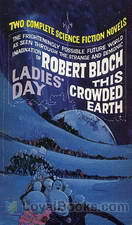 This Crowded Earth
This Crowded Earth
Robert Bloch was a prolific writer in many genres. As a young man he was encouraged by his mentor H. P. Lovecraft, and was a close friend of Stanley G. Weinbaum. Besides hundreds of short stories and novels he wrote a number of television and film scripts including several for the original Star Trek. In 1959 Bloch wrote the novel Psycho which Alfred Hitchcock adapted to film a year later. He received the Hugo Award, the World Fantasy Award, the Bram Stoker Award, and he is a past president of the Mystery Writers of America. Published in Amazing Stories in 1958, This Crowded Earth is a thriller set on an overpopulated Earth of the future. | |
By: Robert E. Howard (1906-1936) | |
|---|---|
 Devil in Iron
Devil in Iron
Conan's lustful desires again get him into a whole pile of trouble. This time the beautiful, golden haired, noble born Octavia, lures him into a fiendish trap set by his most powerful enemies and from which there seems to be no escape. But on the long deserted island of Xapur where he goes to capture this crafty beauty, it is not just mortal enemies that await him; Khosatral Khel a demon that crawled up from the abyss many eons ago and is of a substance as hard as iron has been awakened and is intent on crushing Conan and the woman like bugs for it's amusement... | |
 Jewels of Gwahlur
Jewels of Gwahlur
Conan The Barbarian is after fabulous treasure in this exciting story. But he finds himself in more difficulties than he had counted on. Crafty and powerful human opponents seek to skin him alive, bestial mutations seek to rip his arms off, denizens of the deep want to devour him whole and scantily clad dusky beauties try to waylay him at every step. And all of this to find the Jewels of Gwahlur, the most fabulous treasure every hidden in a secret temple. Has Conan finally met his match? Will his evil enemies or the seductive women finally succeed in making him beg for mercy? Listen and find out... | |
 Beyond the Black River
Beyond the Black River
Conan the Barbarian is employed by one of the civilized countries to help in it's push to claim lands from the primitive Picts. The Picts are not excited about the idea however. Old gods and mythical creatures are called up by the Pict witches to contest the invading army and Conan finds himself battling for his life amid the blood thirsty hordes that include saber-toothed tigers, 40 foot long venomous snakes and a demon from another dimension who is intent on crushing him. The huge dog Slasher makes an appearance here and distinguishes himself so well in a doomed battle to delay their forces that Conan openly praises his courage and pledges that 7 Pict heads will roll in his honor. | |
 Witch Shall Be Born
Witch Shall Be Born
The kingdom of Khauran is admittedly a small one, nestled between the vast desert and the plains, but it is blessed with an abundance of rich soil, hard working devoted inhabitants and much gold but most of all by a sweet young queen who is as wise and beneficent as she is beautiful. But then from out of nowhere, disaster strikes. A horrible witch (her evil twin sister) secretly replaces her and introduces devil worship, human sacrifice and other things too repulsive to mention. Conan, who was the captain of her guard is captured and crucified in the desert... | |
 Queen of the Black Coast
Queen of the Black Coast
Conan finally meets his match in Belit, the fierce, bloodthirsty and scantily clad pirate Queen. She also is unable to resist the huge, blue eyed, iron thewed barbarian who literally sweeps her off her feet. Together they become pirates of legend and are the scourge of the Black Coast. They venture up the river of death where no one has gone in centuries and lived, in search of plunder, battle and adventure. And get get more of all three than they could wish for. | |
 Shadows in Zamboula (version 2)
Shadows in Zamboula (version 2)
In the dark streets of Zamboula, huge ghouls stalk the night seeking victims for their ghastly rites and feasts. Conan is passing through this city and is almost a victim but escapes, only to rush to the aid of a beautiful, voluptuous maiden still in their horrible talons. Swords flash, thews are strained and the mighty Conan almost meets his match in the temple of the monkey god. Will he escape? Will he get the girl? Listen and marvel! Excellent story, well told as always by Howard. Summary by phil chenevert | |
By: Robert Emmett McDowell (1914-1975) | |
|---|---|
 Citadel of the Green Death
Citadel of the Green Death
At the coldly gleaming Experimental Station they flung this choice in Outlaw Joel Hakkyt's teeth: "Grinding, endless slavery on Asgard, that Alpha Centauri hell—or a writhing, screaming guinea-pig's death here?" He chose Asgard, naturally. But what was natural—on Asgard? - Summary by Robert Emmett Mcdowell | |
By: Robert F. Young (1915-1986) | |
|---|---|
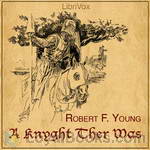 A Knyght Ther Was
A Knyght Ther Was
"But the Knyght was a little less than perfect, and his horse did not have a metabolism, and his 'castle' was much more mobile - timewise! - than it had any business being!" In 2178, once time travel had become a simple task, it had also been outlawed. Those who chose to ingnore this law were known as time-thieves, and Tom Mallory was among the best of them. When he learns the precise whereabouts of the Holy Grail in 542, he sets out to obtain it with the intention of returning it to the 22nd century to make a handsome profit and to settle on Get-Rich-Quick Street... | |
By: Robert Hugh Benson (1871-1914) | |
|---|---|
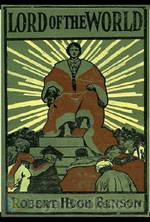 Lord of the World
Lord of the World
“Mr. Benson sees the world, four or five generations hence, free at last from all minor quarrels, and ranged against itself in two camps, Humanitarianism for those who believe in no divinity but that of man, Catholicism for those who believe in no divinity but that of God.” This apocalyptic novel from the early 1900's is sometimes deemed one of the first modern dystopias. | |
 Dawn of All
Dawn of All
In a former book, called "Lord of the World," I attempted to sketch the kind of developments a hundred years hence which, I thought, might reasonably be expected if the present lines of what is called "modern thought" were only prolonged far enough; and I was informed repeatedly that the effect of the book was exceedingly depressing and discouraging to optimistic Christians. In the present book I am attempting -- also in parable form -- not in the least to withdraw anything that I said in the former,... | |
By: Robert Moore Williams (1907-1977) | |
|---|---|
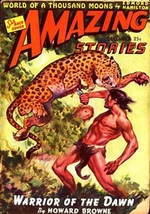 Planet of the Gods
Planet of the Gods
Far, far in the future Earth has achieved real peace and is sending out interstellar expeditions, not to conquer, but to explore. The third such expedition, has made it to the Vega system and discovered to everyone's amazement, not only a solar system but two worlds circling the Vega sun that seem to have atmosphere and water. And apparently intelligent life is there as well as well because something tries, and almost succeeds, in blasting the expedition ship out of space before it can even get close to either one... | |
 Doomsday Eve
Doomsday Eve
In the midst of the war—that terrible conflict that threatened humanity's total destruction—the "new people" suddenly appeared. Quietly performing incredible deeds, vanishing at will, they were an enigma to both sides. Kurt Zen was an American intelligence officer among the many sent to root them out. He found them. Taken captive in their hidden lair, he waited as the enemy prepared to launch the super missile, the bomb to end all bombs—and all life. If only he could find the source of the new people's power, Kurt alone might be able to prevent obliteration of the Earth.... - Summary by Original text | |
 New Lamps
New Lamps
Ronson came to the Red Planet on the strangest mission of all ... he only knew he wanted to see Les Ro, but he didn't know exactly why. It was because he knew that Les Ro had the answer to something that had never been answered before, if indeed, it had ever been asked! For Les Ro traded new lamps for old—and they were the lamps of life itself! A story of what life holds for all of us. - Summary by Author | |
By: Robert Sheckley (1928-2005) | |
|---|---|
 The Status Civilization
The Status Civilization
Will Barrent awakes without memories just before being deposited on Omega, a planet for criminals where the average life expectancy is 3 years. He’s listed as a murderer and released into the illicit society as a “peon” the lowest class imaginable. A mysterious girl gives him a weapon that starts him on his path to status, a path that requires constant brutality. But it must be borne if our hero is to discover the reason for his imprisonment; A reason that pits him against himself, and involves the sardonically similar but devoutly different creeds of Omega and Earth... | |
 Watchbird
Watchbird
3 Robert Sheckley short stories that demonstrate the breathof his fantastic imagination. In Watchbird, the question "can machines solve human problems?" is answered with a resounding YES! But there may be a few unforeseen glitches. Just a few. Warrior Race drops us into an alien race of warriors who fight in a way you will never be able to imagine until you listen. And Beside Still Waters is a gentle story that shows us a man who really wants to get away from it all ... sitting on a rock in the asteroid belt with only a robot for a friend. No girls allowed! A poignant and unsettling story to say the least. | |
By: Robert Silverberg (1935-) | |
|---|---|
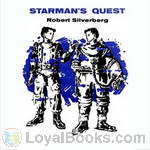 Starman's Quest
Starman's Quest
Travelling at speeds close to that of light, spacemen lived at an accelerated pace. When one of the twin boys left the starship, he grew older while his twin in space barely aged. So the starship twin left the ship to find what happened to his brother who was aging away on earth. | |
 Happy Unfortunate
Happy Unfortunate
Here are two early stories by the well known SF Author Robert Silverberg. The Happy Unfortunate was published first in Amazing Stories in 1957 and explores the angst caused when the human race reaches into space but at the cost of needing to breed a new species; specialized 'spacers' who can withstand the tremendous rigors of acceleration. The Hunted Heroes was published in Amazing stories a year earlier, in 1956. It is a futuristic story that holds great hope for the resilience of the human race after the war destroys most of the world. | |
 Master of Life and Death
Master of Life and Death
When Roy Walton becomes the new director of the UN division of population control, after the director is assassinated, he becomes the most hated man in the world. Being Director involved him in not only population control, but a terra-forming project on Venus, and negotiations with aliens. Not only that, but some people were trying to kill him. To stay alive, he had to become The Master of Life and Death. Summary by Dale Grothman. | |
By: Robert Silverberg and Randall Garrett (1935-) | |
|---|---|
 The Judas Valley
The Judas Valley
Why did everybody step off the ship in this strange valley and promptly drop dead? How could a well-equipped corps of tough spacemen become a field of rotting skeletons in this quiet world of peace and contentment? It was a mystery Peter and Sherri had to solve. If they could live long enough! [from the Judas Valley]Originally published in Amazing Stories, October 1956 | |
By: Samuel Butler (1835-1902) | |
|---|---|
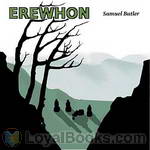 Erewhon
Erewhon
Erewhon, or Over the Range is a novel by Samuel Butler, published anonymously in 1872. The title is also the name of a country, supposedly discovered by the protagonist. In the novel, it is not revealed in which part of the world Erewhon is, but it is clear that it is a fictional country. Butler meant the title to be read as the word Nowhere backwards, even though the letters “h” and “w” are transposed. It is likely that he did this to protect himself from accusations of being unpatriotic, although Erewhon is obviously a satire of Victorian society. | |
By: Sewell Peaslee Wright (1897-1970) | |
|---|---|
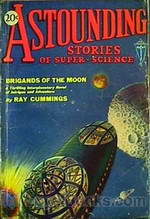 Astounding Stories 03, March 1930
Astounding Stories 03, March 1930
This is the third issue of the classic science fiction Astounding Magazine. It contains the opening chapters of a 4 part serialized novel by Ray Cummings, and stories by the prolific Capt. S. P. Meek, Will Smith and R. J. Robbins, Sewell Peaslee Wright and A. T. Locke. | |
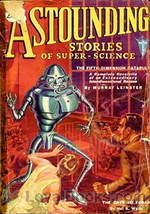 Astounding Stories 13, January 1931
Astounding Stories 13, January 1931
This issue contains "The Dark Side of Antri" by Sewell Peaslea Wright, "The Sunken Empire" by H. Thompson Rich, "The Gate to Xoran" by Hal K. Wells, "The Eye of Allah" by C. D. Willard, "The Fifth-Dimension Catapult" by Murray Leinster, and "The Pirate Planet[' by Charles W. Diffin. | |
 Astounding Stories 07, July 1930
Astounding Stories 07, July 1930
Issue seven of this seminal science-fiction magazine | |
By: Simon Landis (1830-1902) | |
|---|---|
 Entirely New Feature of a Thrilling Novel! Entitled, The Social War of the year 1900; or, The Conspirators and Lovers!
Entirely New Feature of a Thrilling Novel! Entitled, The Social War of the year 1900; or, The Conspirators and Lovers!
Described by io9.com contributor Jess Nevins as “the worst science fiction novel of the 19th century,” The Social War of 1900, or The Conspirators and Lovers! has become infamous for its overwrought prose, flimsy characterizations, ludicrous plotting, and repugnant ideas. For these same reasons, the book has gained infamy as a cultural oddity, a guilty pleasure, and a somewhat over-imaginative work of outsider art. The Social War of 1900 follows the adventures of Dr. Victor Juno, a Naturalist who heals sickness through animal magnetism, and his sweetheart Lucinda... | |
By: Simon Newcomb (1835-1909) | |
|---|---|
 His Wisdom, the Defender: A Story
His Wisdom, the Defender: A Story
A millionaire genius invents a flying armored suit, a la Iron Man. - Summary by Terry Kroenung | |
By: Sir Arthur Conan Doyle (1859-1930) | |
|---|---|
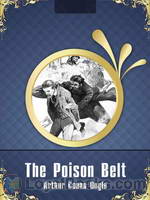 The Poison Belt
The Poison Belt
Three years after the events that took place in The Lost World, Professor Challenger urgently summons his fellow explorers (Professor Summerlee, Lord John Roxton, and reporter E.D. Malone) to a meeting. Oddly, he requires each to bring an oxygen cylinder with him. What he soon informs them is that from astronomical data and just-received telegraphs of strange accidents on the other side of the world, he has deduced that the Earth is starting to move through a region of space containing something poisonous to humankind... | |
By: Stanley Grauman Weinbaum (1902-1935) | |
|---|---|
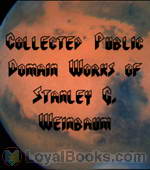 Works of Stanley G. Weinbaum - A Martian Odyssey
Works of Stanley G. Weinbaum - A Martian Odyssey
Stanley G. Weinbaum is best known for his short story “A Martian Odyssey” which has been influencing Science Fiction since it was first published in 1934. Weinbaum is considered the first writer to contrive an alien who thought as well as a human, but not like a human. A Martian Odyssey and its sequel are presented here as well as other Weinbaum gems including 3 stories featuring the egomaniacal physicist Haskel van Manderpootz and his former student, playboy Dixon Wells. | |
By: Stephen Marlowe (1928-2008) | |
|---|---|
 Recruit for Andromeda
Recruit for Andromeda
No one comes back from the Nowhere Journey, whatever they say about some “rotation.” When Kit Temple's drafted, he figures he's leaving his girl, his life, behind forever. But his fellow-draftee, the enigmatic Arkalion, seems to know a lot more than what he's letting on. When Kit follows Arkalion to the end of space and time, he finds out what's really going on in this “Nowhere” and takes on a trial that will decide the fate of Earth itself! | |
By: Terry Carr (1937-1987) | |
|---|---|
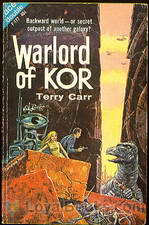 Warlord of Kor
Warlord of Kor
Warlord of Kor was originally published in 1963 as half of an Ace Double, selected by legendary editor Donald A. Wollheim. It is an interplanetary adventure, as humans probe the mysteries of the planet Hirlaj and the few remaining aliens who live there. Terry Carr never really shone as a writer, though he did write some remarkably thoughtful stories. However, his talents as an editor and anthologist were important and undeniable, and he brought many good writers and authors into science fiction and fantasy... | |
By: Thomas Anstey Guthrie (1856-1934) | |
|---|---|
 Tourmalin’s Time Cheques
Tourmalin’s Time Cheques
Peter Tourmalin is on a sea voyage back home to England from Australia, to return to his fiancee, and he is very bored. The fact that the time difference adds on extra hours to his boredom only makes it worse. So when he gets a unique opportunity to deposit his spare time into an account with the “Anglo-Australian Joint Stock Time Bank, Limited” he doesn’t hesitate for long. By opening this account, he doesn’t have to spend his spare time right away, but can withdraw it at any future date, when he wants a break... | |
By: Tom Godwin (1915-1980) | |
|---|---|
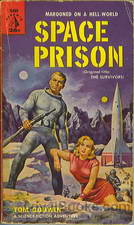 Space Prison
Space Prison
AFTER TWO CENTURIES….The sound came swiftly nearer, rising in pitch and swelling in volume. Then it broke through the clouds, tall and black and beautifully deadly — the Gern battle cruiser, come to seek them out and destroy them. Humbolt dropped inside the stockade, exulting. For two hundred years his people had been waiting for the chance to fight the mighty Gern Empire … with bows and arrows against blasters and bombs! | |
By: Various | |
|---|---|
 Short Science Fiction Collection
Short Science Fiction Collection
Science fiction (abbreviated SF or sci-fi with varying punctuation and case) is a broad genre of fiction that often involves sociological and technical speculations based on current or future science or technology. This is a reader-selected collection of short stories originally published between 1931 and 1963, that entered the US public domain when their copyright was not renewed. Summary by Cori Samuel, with Wikipedia input. | |
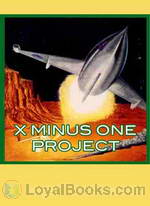 X Minus One Project
X Minus One Project
This is a collection of public domain science fiction stories which were turned into half-hour plays for the classic mid-1950's American radio series, X Minus One. All of these stories were added to Project Gutenberg via Greg Weeks and crew at Distributed Proofreaders. | |
 Short Science Fiction Collection 054
Short Science Fiction Collection 054
Science fiction is a genre encompassing imaginative works that take place in this world or that of the author’s creation where anything is possible. The only rules are those set forth by the author. The speculative nature of the genre inspires thought and plants seeds that have led to advances in science. The genre can spark an interest in the sciences and is cited as the impetus for the career choice of many scientists. It is a playing field to explore social perspectives, predictions of the future, and engage in adventures unbound into the richness of the human mind. - Summary by Amy Gramour | |
 Short Science Fiction Collection 055
Short Science Fiction Collection 055
Science fiction is a genre encompassing imaginative works that take place in this world or that of the author’s creation where anything is possible. The only rules are those set forth by the author. The speculative nature of the genre inspires thought and plants seeds that have led to advances in science. The genre can spark an interest in the sciences and is cited as the impetus for the career choice of many scientists. It is a playing field to explore social perspectives, predictions of the future, and engage in adventures unbound into the richness of the human mind. | |
 Short Science Fiction Collection 056
Short Science Fiction Collection 056
Science fiction is a genre encompassing imaginative works that take place in this world or that of the author’s creation where anything is possible. The only rules are those set forth by the author. The speculative nature of the genre inspires thought and plants seeds that have led to advances in science. The genre can spark an interest in the sciences and is cited as the impetus for the career choice of many scientists. It is a playing field to explore social perspectives, predictions of the future, and engage in adventures unbound into the richness of the human mind. - Summary by Amy Gramour | |
 Short Science Fiction Collection 057
Short Science Fiction Collection 057
Science fiction is a genre encompassing imaginative works that take place in this world or that of the author’s creation where anything is possible. The only rules are those set forth by the author. The speculative nature of the genre inspires thought and plants seeds that have led to advances in science. The genre can spark an interest in the sciences and is cited as the impetus for the career choice of many scientists. It is a playing field to explore social perspectives, predictions of the future, and engage in adventures unbound into the richness of the human mind. - Summary by Amy Gramour | |
 Short Science Fiction Collection 058
Short Science Fiction Collection 058
Science fiction is a genre encompassing imaginative works that take place in this world or that of the author’s creation where anything is possible. The only rules are those set forth by the author. The speculative nature of the genre inspires thought and plants seeds that have led to advances in science. The genre can spark an interest in the sciences and is cited as the impetus for the career choice of many scientists. It is a playing field to explore social perspectives, predictions of the future, and engage in adventures unbound into the richness of the human mind. - Summary by A. Gramour | |
 Short Science Fiction Collection 059
Short Science Fiction Collection 059
Science fiction is a genre encompassing imaginative works that take place in this world or that of the author’s creation where anything is possible. The only rules are those set forth by the author. The speculative nature of the genre inspires thought and plants seeds that have led to advances in science. The genre can spark an interest in the sciences and is cited as the impetus for the career choice of many scientists. It is a playing field to explore social perspectives, predictions of the future, and engage in adventures unbound into the richness of the human mind. - Summary by A. Gramour | |
 Short Science Fiction Collection 060
Short Science Fiction Collection 060
Science fiction is a genre encompassing imaginative works that take place in this world or that of the author’s creation where anything is possible. The only rules are those set forth by the author. The speculative nature of the genre inspires thought and plants seeds that have led to advances in science. The genre can spark an interest in the sciences and is cited as the impetus for the career choice of many scientists. It is a playing field to explore social perspectives, predictions of the future, and engage in adventures unbound into the richness of the human mind. | |
 Short Science Fiction Collection 061
Short Science Fiction Collection 061
Science fiction is a genre encompassing imaginative works that take place in this world or that of the author’s creation where anything is possible. The only rules are those set forth by the author. The speculative nature of the genre inspires thought and plants seeds that have led to advances in science. The genre can spark an interest in the sciences and is cited as the impetus for the career choice of many scientists. It is a playing field to explore social perspectives, predictions of the future, and engage in adventures unbound into the richness of the human mind... | |
 Short Science Fiction Collection 062
Short Science Fiction Collection 062
Science fiction is a genre encompassing imaginative works that take place in this world or that of the author’s creation where anything is possible. The only rules are those set forth by the author. The speculative nature of the genre inspires thought and plants seeds that have led to advances in science. The genre can spark an interest in the sciences and is cited as the impetus for the career choice of many scientists. It is a playing field to explore social perspectives, predictions of the future, and engage in adventures unbound into the richness of the human mind. -A. Gramour | |
 Short Science Fiction Collection 063
Short Science Fiction Collection 063
Science fiction is a genre encompassing imaginative works that take place in this world or that of the author’s creation where anything is possible. The only rules are those set forth by the author. The speculative nature of the genre inspires thought and plants seeds that have led to advances in science. The genre can spark an interest in the sciences and is cited as the impetus for the career choice of many scientists. It is a playing field to explore social perspectives, predictions of the future, and engage in adventures unbound into the richness of the human mind. - Summary by A. Gramour | |
 Short Science Fiction Collection 064
Short Science Fiction Collection 064
Science fiction is a genre encompassing imaginative works that take place in this world or that of the author’s creation where anything is possible. The only rules are those set forth by the author. The speculative nature of the genre inspires thought and plants seeds that have led to advances in science. The genre can spark an interest in the sciences and is cited as the impetus for the career choice of many scientists. It is a playing field to explore social perspectives, predictions of the future, and engage in adventures unbound into the richness of the human mind.-A. Gramour | |
 Short Science Fiction Collection 065
Short Science Fiction Collection 065
Science fiction is a genre encompassing imaginative works that take place in this world or that of the author’s creation where anything is possible. The only rules are those set forth by the author. The speculative nature of the genre inspires thought and plants seeds that have led to advances in science. The genre can spark an interest in the sciences and is cited as the impetus for the career choice of many scientists. It is a playing field to explore social perspectives, predictions of the future, and engage in adventures unbound into the richness of the human mind. | |
 Short Science Fiction Collection 066
Short Science Fiction Collection 066
Science fiction is a genre encompassing imaginative works that take place in this world or that of the author’s creation where anything is possible. The only rules are those set forth by the author. The speculative nature of the genre inspires thought and plants seeds that have led to advances in science. The genre can spark an interest in the sciences and is cited as the impetus for the career choice of many scientists. It is a playing field to explore social perspectives, predictions of the future, and engage in adventures unbound into the richness of the human mind. - Summary by A. Gramour | |
 20 Short Science Fiction Stories
20 Short Science Fiction Stories
Compilation of 20 Science Fiction Short Stories - Summary by Kirk Ziegler | |